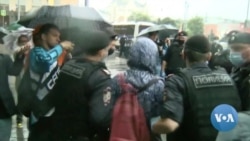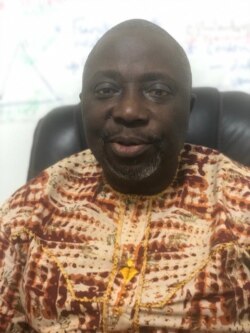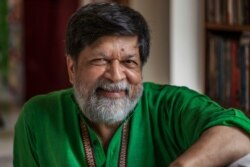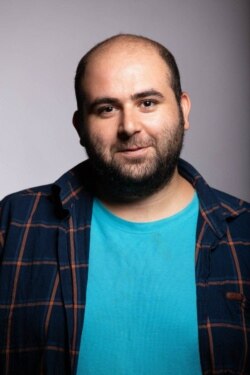International human rights lawyer Amal Clooney has represented clients in some of the most high-profile press freedom cases in recent years. On Thursday, actor Meryl Streep presented Clooney with an award in recognition of that work.
Clooney received the Gwen Ifill Press Freedom Award alongside journalists from Bangladesh, Iran, Nigeria and Russia, who received the 2020 International Press Freedom Award from the New York-based Committee to Protect Journalists (CPJ).
As part of the gala, which was hosted remotely because of the pandemic and streamed in the United States and other countries, Maria Ressa of the Philippine online news website Rappler interviewed Clooney about her work, including representing Ressa in a series of cyber libel cases.
“[The interview is] this really amazing blend of the personal and the professional, and you really see Maria Ressa’s excellence at work in this interview. And you see Amal for the compassionate, caring lawyer and just person and friend that she becomes to the people that she protects and defends as a human rights lawyer,” CPJ advocacy director Courtney Radsch told VOA.
Nigeria
The 2020 International Press Freedom Award honorees are Dapo Olorunyomi from Nigeria; Shahidul Alam from Bangladesh; Mohammad Mosaed from Iran; and Svetlana Prokopyeva from Russia. All have faced harassment, legal action or attacks for their work.
Olorunyomi, co-founder of Nigeria’s Premium Times, says the media are working in a more restrictive environment. He has been arrested twice for his journalism and told VOA he sees a lack of access to information and restrictive laws as the biggest challenges for the press.
“We have about 28 constraining laws and statutes that just make the work of journalism very difficult,” he said. “We have some of these really crazy laws that criminalize journalism.”
One of those laws is the Nigerian Cybercrime Act, which authorities have arrested journalists under in the African nation.
Bangladesh
Laws involving the use of electronic media and false news are also a problem in Bangladesh.
Alam, co-founder of the Pathshala Media Institute and the Drik Picture Library, has been jailed under the country’s Information and Communication Technology Act and physically attacked for his work.
The photojournalist says press freedom in the country has gone downhill.
“We were under military rule at one point. That's when I had a loaded gun pointed at my head. When democracy came, we thought things would change. But this is by far the worst it's ever been. I think we live in an environment of fear,” Alam said.
Public support for media encourages journalists to continue their work, Alam said.
“The fact that there are people rooting for you. The fact that you feel what you're doing is for the public good, is the nourishment we need,” he said.
Alam said governments need to be reminded that journalists are there because people need them.
“And they [journalists] will sometimes say uncomfortable things. That's part of the terrain,” he said.
Iran
Access to independent public interest journalism is important in closed-off countries like Iran.
Freelancer Mosaed covers corruption, economic sanctions and protests on social media platforms. In August, Iran sentenced him to over four years in prison for his work and banned him from journalism and using electronic devices. He is waiting to hear when the courts will act on the verdict.
“A lot of journalists around the world have relied on people like Mohammad in times of crisis,” said Sherif Mansour, the Middle East and North Africa program coordinator for CPJ. “He's providing a service to Iranian citizens and to the international community at the same time. And for him to be jailed just for stating facts … it just shows how the Iranian government [disregards] media and journalism.”
Russia
In July, Prokopyeva, the regional correspondent for Radio Free Europe/Radio Liberty’s Radio Svoboda, was convicted by a court for “justifying terrorism.” Prokopyeva says authorities do not tolerate criticism.
“Journalists in Russia face pressure in the same way activists face pressure. ... What we do is normal and should exist in a normal society," she said. "But if we abandon our profession, stop what we do, then our country, our society as a whole, will be even further from normality from civilization than it is now.”
‘We need each other’
With a free press under threat, CPJ says the work of international lawyers like Clooney is ever more important.
“When we look at how we protect and defend press freedom, it takes a community to do it. It's not just about the journalists and media organizations. It's also about the lawyers who defend them when they get into trouble. … The recognition of Amal Clooney with the Gwen Ifill Press Freedom Award this year really recognizes the symbiosis between the legal community and the journalistic community. We need each other,” CPJ’s Radsch said.
Jesusemen Oni contributed to this report.










